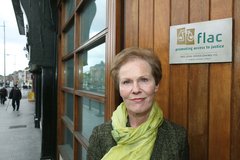‘Tougher than ever’ context for households in arrears means less dramatic increase is cause for deep worry
21 June 2013

Legal rights group FLAC (Free Legal Advice Centres) warns that the context for the steady increase in mortgage arrears is one where borrowers in trouble still lack any sufficient structures to support them in dealing with their serious debts. Further, the government, despite promises to the contrary, seems to have ceded to pressure from the banking sector in setting the power balance between lenders and borrowers.
The independent organisation says that the Quarter 1 2013 mortgage arrears figures show a “relentless and consistent rise in households in mortgage arrears”. FLAC Director General Noeline Blackwell commented that “As a society, we risk becoming inured to the fact that today's figures show that 1 in every 8 private houses with a mortgage is in trouble with arrears of 3 months or more on their accounts. In fact, we may not even notice a very serious problem revealed by the 12% growth quarter-on-quarter of private home mortgages that are carrying deep arrears of 2 years (720 days) or more.”
FLAC says a number of very worrying developments were exacerbating the position of people in arrears:
- The state still has no insolvency system in operation;
- The Code of Conduct on Mortgage Arrears, which has been to date the only protection for borrowers in dealings with their banks, has been revised by the Central Bank and although it is not issuing until next week, it appears it has been altered to suit the banking agenda rather than consumers’ interests;
- New draft legislation is on the way to make it more convenient and simpler for lenders to pursue borrowers and arrange repossessions of homes.
So while the arrears figures appear less dramatic, the grim context for debtors struggling to deal with their arrears makes them of grave concern, with things tougher than ever for borrowers.
And FLAC would argue that this rise is inexorable but not inevitable. According to Ms Blackwell, “At least part of the blame must lie with our legislators, policy makers and government. Our banks are permitted to deal with each debt on a case by case basis, allowing them to entirely control the timing of negotiations and to control what restructuring solutions they propose.
“The Central Bank is requiring a number of the banks to make offers to borrowers, but where is the quality control on these offers? They are not necessarily decent offers that will keep people in their homes. As it stands, over 95,000 households are living with the awful misery of fearing for the roof over their heads. What are we as a society, if this is not a matter for serious debate and an integrated, urgent policy response?”
/Ends
________________________________________________
Editors’ notes:
- FLAC (Free Legal Advice Centres) is a human rights organisation which exists to promote equal access to justice for all. FLAC is an NGO that relies on a combination of statutory funding, contributions from the legal professions and donations from individuals and grant-making foundations to support its work. FLAC offers basic legal information through its telephone information line (1890 350 250) and free legal advice through its network of 80 volunteer evening advice centres. www.flac.ie/help/. It also campaigns on a range of issues including personal debt, fairness in social welfare law, public interest law and civil legal aid.
- FLAC's recent releases on personal debt law reform are available at http://www.flac.ie/news/.
- In particular, see our release on Weds 19 June re Seanad debate on the Central Bank (Supervision & Enforcement) Bill 2011
- Central Bank figures for Quarter 1, 2013 mortgage arrears are available on its website.